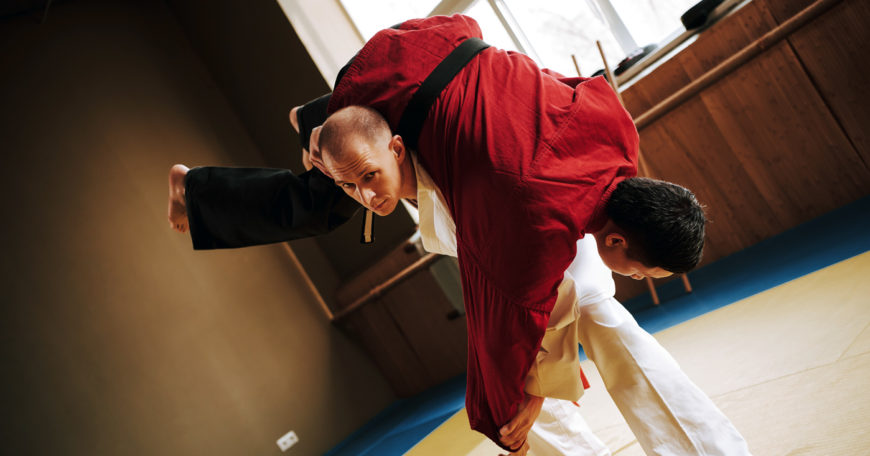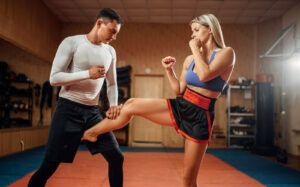Jiu-jitsu is often touted as a great martial art for self-defense. Learning to grapple is an effective way to protect yourself, especially with so many street fights ending up on the ground. When applied properly, the techniques you learn in BJJ class can help you stay safe while controlling your attacker.
The catch, however, is that many jiu-jitsu academies don’t teach BJJ specifically for self-defense scenarios. As competitive grappling has exploded in popularity in recent years, many students sign up for jiu-jitsu in hopes of becoming a world champion one day, and academies cater to that demand. While learning jiu-jitsu with a competitive focus in mind is still helpful for anyone who wants to protect themselves in volatile hand-to-hand altercations, assuming that “sport jiu-jitsu” will perfectly translate over to self-defense jiu-jitsu could be a fatal mistake… and assuming your self-defense skills will be allowed in competition could get you disqualified.
Why is jiu-jitsu good for self-defense?
Though not every fight ends up on the ground, many of them do. Unfortunately, this is where many people are the most vulnerable. During a fist fight, being on your feet gives you a better chance of being able to disengage and avoid further damage to yourself or your assailant. On the ground, though, one person usually has a clear advantage over the other, especially if they gain the top position.
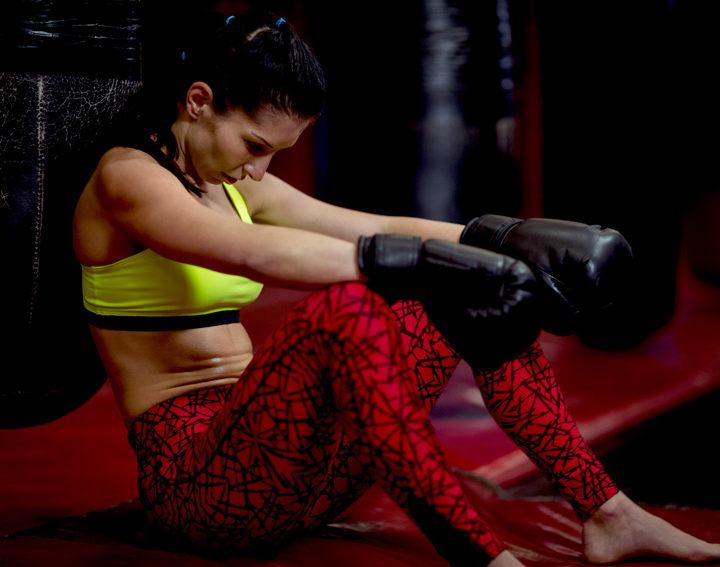
Training BJJ increases the chance that if the fight does go to the ground, you’re the one in the best position or can at least protect yourself if your opponent ends up on top of you. Understanding how to distribute your weight and create leverage to reverse dangerous positions can give you control over the fight, reducing the chances that you or your attacker will incur serious injuries.
Consider how these factors could make jiu-jitsu ideal for common situations in which self-defense tactics are needed. Security officers and bouncers could be better equipped to handle aggressive patrons. Children could defend themselves from bullies who corner them at school. People could protect themselves if a date, taxi driver, or domestic partner became aggressive.
First responders could protect themselves and victims or suspects without needing to rely on potentially lethal weapons. Obviously, the goal is to not get into dangerous situations at all, especially if there are multiple attackers, but if it can’t be avoided, knowing how to handle yourself on the ground can give you a much better chance of making it out unharmed.
Should we add somewhere that a disadvantage would be if there are multiple attackers it’s not the best scenario?
[Related: The 7 Best Martial Arts For Self-Defense]
How To Succeed in Competitive Jiu-Jitsu
There are generally three ways to win in jiu-jitsu competitions: submission, points, or referee decision. These can vary depending on the ruleset, however, and some events don’t allow points at all.
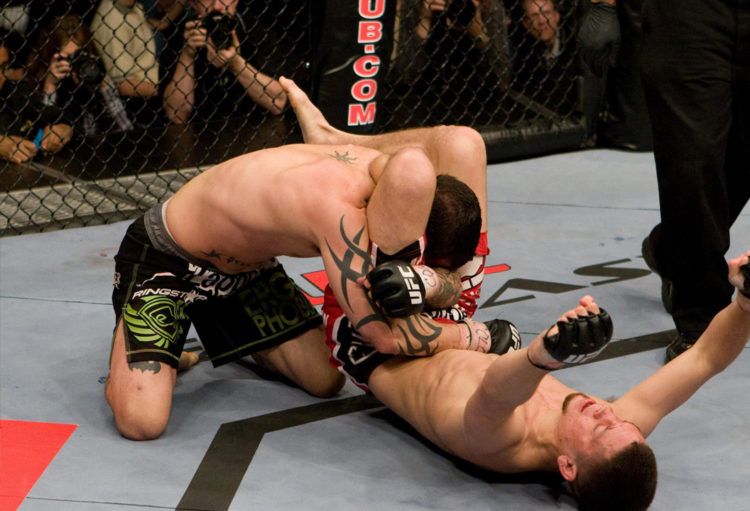
When training jiu-jitsu with competition in mind, your focus will likely be dedicated to:
- Maximizing points and position. In many major competitive BJJ organizations (including the IBJJF), position and points are prioritized, leading to strategies that may involve immediately and deliberately sitting down on the mats to play guard. Competitors are rewarded for dominant positions like mount and side control, but they may also spend a few seconds in each position before moving on to ensure that they get points from the referee.
- Working with a time limit. Quick submissions in competition are ideal, but not always possible. Oftentimes, athletes who are up by points will stall in certain positions until the clock runs down to ensure that they can still pull off a win even if they don’t think they can finish the match with a submission.
- Avoiding prohibited techniques. Yes, jiu-jitsu is a combat sport, but athlete safety is paramount. Many techniques, such as heel hooks, neck cranks, slams, and small joint manipulation are prohibited in competition (depending on the event and experience level of the competitors), and as such, your coach will likely only have you practice the techniques you are allowed to use when you compete.
The big takeaway to remember in sport jiu-jitsu is that the techniques used are meant for a controlled environment that factors in time, safety, and in the case of professional events, entertainment value.
[Related: Brazilian Jiu-Jitsu Belt System: The Journey to Black Belt]
How To Succeed in Self-Defense Jiu-Jitsu
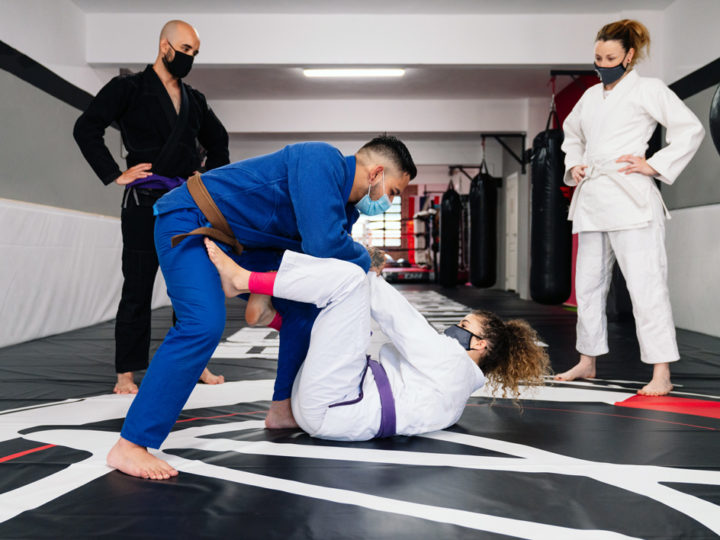
Unlike sport-based jiu-jitsu, BJJ for self-defense prioritizes your safety at all costs (though ideally, your assailant also lives to face justice). With no rules and no external safety regulations, it’s up to the jiu-jitsu practitioner to control the fight as much as possible by:
- Gaining the top or back position. Using your guard to stay safe can be effective temporarily, but to stay safe and control your opponent, taking the back, mount, or side control position should be the goal.
- Focusing on choke holds if a submission is necessary. A person can still be dangerous with a broken arm or torn ligament. Understanding air chokes (and how to threaten with them without actually choking out your attacker) is a much better option if you need to put an aggressive person to sleep for your own safety.
- Being prepared for dangerous moves. Your opponent may resort to any means necessary to hurt you, including eye-gouging, punches, kicks, slams, and weapons. Training jiu-jitsu for self-defense means being prepared for this rather than assuming they will play fair.
Learning jiu-jitsu for self-defense means understanding that just because you’re playing by the “rules” doesn’t mean that your attacker will be as well.
[Related: BJJ Is The Best Martial Art For Getting In Shape]
Which Jiu-Jitsu Goal Is Better?
There’s plenty of overlap in sport and self-defense jiu-jitsu, so as long as you’re learning BJJ from a reputable instructor, you’ll never be completely helpless whether you’re tackled by a drunk customer or taken down by a friendly opponent under the watchful eye of a referee.
Everyone starts jiu-jitsu for different reasons, and there’s no shame in wanting to tailor your learning to your own goals, whether those involve protecting yourself from the bad guys or becoming an elite athlete. If you decide you want to change your focus in the middle of your journey, that’s fine, too!
Grappling For Sport & Safety
Jiu-jitsu students are fortunate to have found such a practical martial art that doubles as a fun sport. Whether you dedicate your time on the mats to learning to protect yourself, making it to the top of a podium, or a combination of the two, you can achieve your goals with an instructor who wants to help you succeed.

